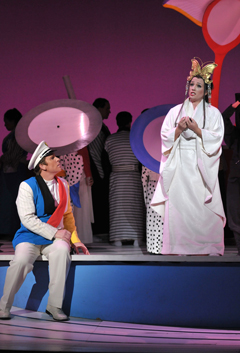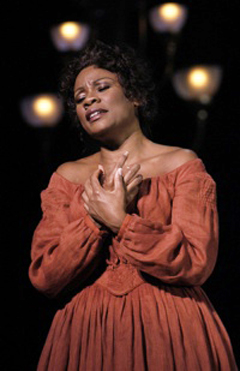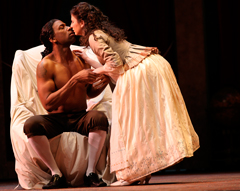Opera Company of Philadelphia
"…there is ceremonial formality in Cynthia Stokes' stage direction…As in Greek tragedy, the restrained windup made the finale more devastating…Then came one of the best touches of all: As Butterfly bleeds to death by her own hand, does Lt. Pinkerton see her dying seconds? Does Butterfly get to glimpse him just before she expires? Director Stokes did neither. I won't spoil it for audiences who have yet to see it, but with the clean starkness of the sets, her choice has existential depths. Ultimately, the production made you see Butterfly's point of view: Suicide was her sole option."
David Patrick Stearn, Philadelphia Inquirer
"The production of Madama Butterfly by the Opera Company of Philadelphia, which I saw on the last day of its run October 18, was perhaps the most beautiful I’ve ever seen...The denouement was staged with an originality that maintained the opera’s essence..."
Steven Cohen Broad Street Review
"The audience buzzed with excitment as they entered the Academy of Music for the Opera Company’s 2009-2010 season opening production of Puccini’s Madama Butterfly, directed by Cynthia Stokes. The most spectacular scene in the entire performance was that of the bridal processsion as Madama Butterfly and her family seem to float onto the stage and toward her husband-to-be."
Alexis Siemons, Philly2Philly
"Director Cynthia Stokes evokes mythic resonances in the Opera Company’s Madame Butterfly…The costumes are part of the scene, not a separate element, and the whole
ensemble displays a unity of effect that moves the drama onto the archetypal plane where director Stokes clearly wants it. The result is a production that works with the
deeper resonances of the drama, while elevating its more conventional elements. Stokes’s staging ends, however, with a forceful reassertion of heritage and tradition.
When Cio-Cio San faces the choice of suicide, she does so not with the thought of vengeance, but of honor. This is very Japanese. At the last, then, the cultural identity Madame Butterfly has despised and rejected returns to claim her, but also to give her a final assertion of dignity. Cio-Cio San, the geisha and would-be American housewife, dies a daughter of her native country."
Robert Zaller, Broad Street Review



















